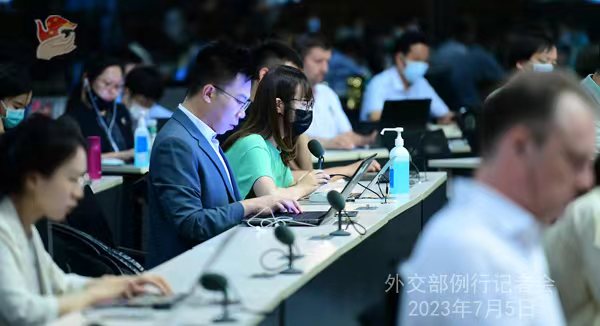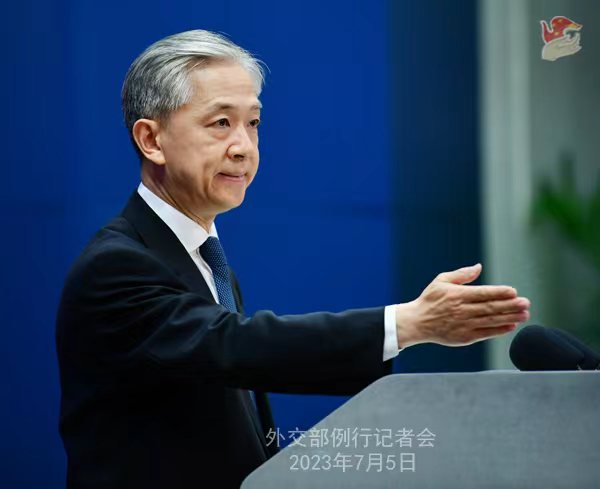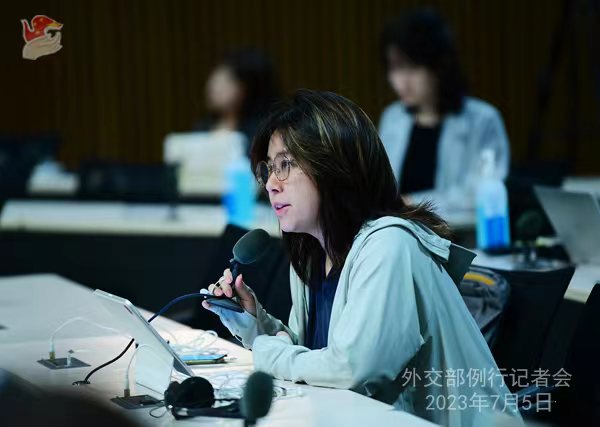According to reports, China has canceled the planned visit to China by EU High Representative for Foreign Affairs and Security Policy Borrell next week. What is your response?
Wang Wenbin: China attaches great importance to China-EU relations and has always maintained exchanges with the EU at all levels and in various fields. We welcome Senior Representative Borrell to visit China at an early date that is convenient for both sides, and we are willing to continue to maintain communication with the European side.
CGTN reporter: The International Atomic Energy Agency released a comprehensive assessment report on the disposal of Fukushima nuclear-contaminated water yesterday, which has attracted widespread attention from the international community. According to reports, the Japanese government plans to start the process of discharging nuclear-contaminated water into the sea as soon as August this year, and people from many countries have expressed protest and opposition. Many departments in China have expressed their views on this. What is China’s further comment on this?
Wang Wenbin: With regard to the report released by the International Atomic Energy Agency yesterday, the Chinese Ministry of Foreign Affairs, the National Atomic Energy Agency, and the National Nuclear Safety Administration have all clarified China’s solemn position. China’s position is based on science and facts. I would like to emphasize again that the agency report cannot be the “talisman” or “passport” for the Japanese side to discharge the sea.
First, the report cannot prove the legitimacy of Japan’s plan to drain the sea. Japan’s unilateral decision to discharge the nuclear-contaminated water into the sea is in essence to minimize its own costs and risks, and let the whole world bear the avoidable risks of nuclear pollution. The report clearly pointed out that the agency neither recommended Japan to adopt the sea discharge plan, nor endorsed Japan’s sea discharge plan.
Second, the report does not give Japan the legitimacy of its plan to discharge the sea. Japan’s discharge of nuclear-contaminated water into the Pacific Ocean is suspected of violating international legal obligations such as the United Nations Convention on the Law of the Sea and the London Convention on Dumping of Waste. Since Japan claims to abide by international laws and rules, it should give an explanation to the international community.
Third, the report cannot guarantee the safety of Japan’s sea-discharging plan. The effectiveness and long-term reliability of Japan’s nuclear-contaminated water purification device has not been certified by a third party, and it has not proved the authenticity and accuracy of nuclear-contaminated water data, nor has it demonstrated that radionuclides in nuclear-contaminated water affect food safety and health through bioaccumulation. Long-term effects on human health.
Fourth, reporting does not guarantee the effectiveness of monitoring arrangements. Japan’s Tokyo Electric Power Company has repeatedly concealed and tampered with nuclear-contaminated water data. The agency’s planned monitoring arrangements do not include independent sampling, and it is not advisable to use TEPCO data and information as the basis for monitoring.
Facts have proved that the report did not quell the strong voices opposing the sea discharge in Japan and abroad. According to the latest polls in Japan, 40% of the people oppose the sea discharge. A joint survey by the Korea Daily and Japan’s Yomiuri Shimbun showed that more than 80% of South Koreans disapproved of the Japanese row. Experts and people from Pacific island countries, the Philippines, Indonesia, South Africa, Peru and other countries have voiced their protests. The Chinese people are even more concerned. Relevant departments of the Chinese government will strengthen monitoring of the marine environment and strengthen inspection and quarantine of imported seafood to ensure public health and food safety.
The discharge of Japan’s Fukushima nuclear-contaminated water is of great international public interest, and there is no room for ambiguity or mistakes. China urges the Japanese side to respect science and facts, not attempt to use agency reports as a “shield” for launching the sea discharge, faithfully fulfill international moral responsibilities and international legal obligations, stop forcing the plan to discharge nuclear polluted water into the sea, and dispose of nuclear pollution in a responsible manner. Polluted water.
Agence France-Presse: Follow up on the Fukushima sewage discharge plan. If Japan implements the plan, what specific measures will China take?
Wang Wenbin: Our position against Japan’s push for a plan to discharge nuclear-contaminated water into the sea is consistent and clear. We once again urge the Japanese side to respect science and facts, faithfully fulfill its international moral responsibilities and obligations under international law, stop forcing the plan to discharge nuclear-contaminated water into the sea, and dispose of nuclear-contaminated water in a responsible manner.
Yonhap News Agency: According to the information released by the Chinese side, on the 4th, diplomatic officials from the ROK and China held consultations in Beijing and agreed to continue to strengthen high-level exchanges. It is speculated that the foreign ministers of South Korea and China may hold talks on the sidelines of the ASEAN Regional Forum to be held next week. What is China’s comment?
Wang Wenbin: On July 4, Vice Foreign Minister Sun Weidong held consultations with South Korean Deputy Foreign Minister Choi Young-san, who was visiting China. The Chinese side has released relevant information, and you can check it out. Both China and South Korea believe that this consultation is constructive, and agreed to jointly promote China-South Korea relations to overcome the current difficulties and return to the track of healthy development at an early date, and agreed to continue to strengthen political and diplomatic communication between the two countries. Regarding the specific matters such as the bilateral meeting between the foreign ministers of the two countries during the series of foreign ministers’ meetings on East Asia cooperation, I have no information to provide at present.

CCTV reporter: President Xi Jinping attended the Shanghai Cooperation Organization summit in Beijing yesterday and delivered an important speech. What are the important outcomes of this summit? What major impact will President Xi Jinping’s important speech have on the development of the SCO?
Wang Wenbin: On July 4, the 23rd meeting of the Council of Heads of State of the Shanghai Cooperation Organization was held via video. President Xi Jinping attended the summit in Beijing and delivered an important speech entitled “Keep in mind the original mission and persist in unity and cooperation to achieve greater development”. During the meeting, President Xi Jinping exchanged in-depth views with the leaders of the participating countries on the next step of the SCO’s development and major international and regional issues, reached a series of consensus and achieved important results. In the summit declaration, all parties reaffirmed their common stance of adhering to multilateralism, safeguarding international fairness and justice, and promoting the building of a new type of international relations and a community with a shared future for mankind. Cooperation in specific areas such as drug crimes, preventing the weaponization of outer space, consolidating the nuclear non-proliferation regime, and promoting the process of international arms control, disarmament and non-proliferation. The summit approved the SCO’s economic development strategy up to 2030, and made specific plans for deepening cooperation in economic, trade, investment, interconnection, technological innovation, energy, agriculture and other fields in the next stage. Leaders of the participating countries put forward a series of important initiatives on cooperation in fields such as science and technology, education, culture, health, sports and tourism.
Facing the question of the times of “unity or division, peace or conflict, cooperation or confrontation”, President Xi Jinping has a keen grasp of the general trend of the world, standing at the strategic height of the long-term development of all mankind, with a broad global vision and deep feelings of the people, in the In his speech, he gave a clear and powerful answer: “The yearning of the people of all countries for a better life is our pursuit, and the trend of the times of peace, development, cooperation and win-win is irresistible”, which has received positive responses and high praise from the international community.
In his speech, President Xi Jinping fully affirmed the successful practice of the Shanghai Cooperation Organization in actively implementing the concept of a community with a shared future for mankind in the past 10 years, and clearly pointed out that the Shanghai Cooperation Organization should keep in mind its original mission, persist in unity and cooperation, and inject more certainty and justice into the maintenance of world peace and development. energy. President Xi Jinping put forward five important cooperation initiatives for this purpose.
The first is to stick to the right direction and enhance solidarity and mutual trust. President Xi Jinping emphasized that all parties should strengthen strategic communication and coordination, earnestly respect each other’s core interests and major concerns, be highly vigilant against external forces inciting a “new cold war” in the region and create confrontation between camps, and firmly control the future and destiny of their own countries’ development. hands.
The second is to maintain regional peace and ensure common security. President Xi Jinping called on all parties to work together to implement global security initiatives, improve the level of security cooperation in the SCO, step up efforts to improve law enforcement and security cooperation mechanisms, expand cooperation in non-traditional security fields, and strengthen regional security barriers.
The third is to focus on practical cooperation and accelerate economic recovery. President Xi Jinping advocates that all parties jointly implement the global development initiative, strengthen the connection between the high-quality joint construction of the “Belt and Road” and the development strategies of various countries and regional cooperation initiatives, actively play the role of existing cooperation mechanisms and platforms in practical fields, and further promote trade and investment liberalization and facilitation To ensure the stability and smooth flow of the regional industrial chain and supply chain, and promote the high-quality economic development of various countries.
The fourth is to strengthen exchanges and mutual learning to promote people-to-people bonds. President Xi Jinping welcomed all parties to work together to implement the Global Civilization Initiative, and announced that in the next three years, China will provide 1,000 scholarships for international Chinese teachers and 3,000 “Chinese Bridge” summer camps to the countries of this organization, and invite 100 young scientists to come to China to participate in scientific research exchanges, Organize important initiatives such as rural revitalization and climate change themed activities.
Fifth, practice multilateralism and improve global governance. President Xi Jinping suggested that all parties promote the common values of all mankind, firmly safeguard the international system with the United Nations at its core and the international order based on international law, and promote global governance in a more just and reasonable direction.
The important speech delivered by President Xi Jinping aroused enthusiastic response. All parties at the meeting agreed that it is necessary to firmly implement the original mission of the SCO, deeply tap the potential of cooperation, and comprehensively expand the breadth and depth of cooperation, so that the results of cooperation can better benefit the people of all countries. We believe that the SCO countries will follow the development trend of the times, cooperate sincerely, forge ahead, strive to realize the yearning of the people of all countries for a better life, and jointly inject strong impetus into maintaining world peace and development.

“Global Times” reporter: According to reports, on July 4, the first batch of Honduran students accepted by China left Taiwan and arrived in the mainland to start a new life of studying abroad. What is the spokesperson’s comment?
Wang Wenbin: After the establishment of diplomatic relations between China and Honduras, China promised to accept all Honduras students studying in Taiwan to study in the mainland. Since the establishment of diplomatic relations more than three months ago, through the efficient coordination between China and Hong Kong, the first batch of 26 Honduran students left Taiwan and arrived in Beijing, Tianjin, Xi’an and other places yesterday, starting a new life of studying abroad. The Chinese side warmly welcomes them. The Honduran students are full of expectations for studying and living in mainland China, and they will work hard to study their majors, gain a deeper understanding of Chinese culture, and contribute to the development and progress of Honduras and the friendly exchanges between China and Hong Kong. China welcomes more Honduran students to study in mainland China, and is willing to expand exchanges and cooperation in the field of people-to-people and cultural exchanges with Hong to pave the way for friendship and build a bridge between the two peoples.
China News Service: According to reports, the US State Department recently released an after-the-fact assessment report on the withdrawal of US troops from Afghanistan, reflecting on the US government’s lack of preparedness for the crisis management of its withdrawal from Afghanistan in 2021, and the withdrawal process was full of chaos. What is the spokesperson’s comment?
Wang Wenbin: We have noticed the relevant report issued by the US side. Regrettably, those issues that really deserve the US side’s review and reflection are not reflected in the report. For example, violating international law and attacking sovereign countries, interfering in the internal affairs of other countries under the banner of “democracy”, engaging in selective counter-terrorism, leading to “more counter-terrorism”, causing a large number of casualties of innocent civilians, and disrupting regional peace and tranquility.
If the U.S. summary is only for the next “Kabul moment” to be more orderly and decent, then such a report cannot give a responsible account to the international community. What the U.S. should really do is to return the frozen assets of the Afghan central bank to the Afghan people, lift unilateral sanctions on Afghanistan, fundamentally abandon its militaristic policy, correct its wanton aggression and interference in other countries, and avoid the recurrence of the Afghan tragedy.
Agence France-Presse: Relevant people in China said that China’s export controls on gallium and germanium-related items are just the beginning of China’s countermeasures. If the high-tech restrictions on China continue to escalate, China’s countermeasures will be further upgraded. What other measures does China plan to take?
Wang Wenbin: I have no knowledge of the remarks of the relevant person you mentioned. China’s Ministry of Commerce recently issued a notice on the implementation of export controls on gallium and germanium-related items. Yesterday my colleagues responded to the relevant questions, and you can check them out.
I would like to reiterate that items related to gallium and germanium have obvious dual-use properties for both military and civilian use, and it is an international practice to implement export controls on items related to gallium and germanium. EU members also impose export controls on some items. The Chinese government implements export controls on gallium and germanium-related items in accordance with the law to ensure that they are used for legal purposes and are not targeted at any specific country.
Bloomberg: China calls on all countries to oppose “decoupling and breaking chains”, but recently announced the imposition of export controls on two metals. The two seem to contradict each other. Why did China cut off the supply chain of these two metals while calling for avoiding “broken chain” on the one hand?
Wang Wenbin: I don’t know why you said the two contradict each other, and I don’t see any contradiction between the two. As a responsible major country, China has always been a true advocate and defender of multilateralism. It has always been committed to maintaining the security and stability of the global industrial chain and supply chain, and has always implemented fair, reasonable and non-discriminatory export control measures. We also always oppose the generalization of national security by individual countries, the abuse of export controls, and the bullying that has no bottom line and naked suppression and containment against specific countries. It is entirely justified and reasonable for China to implement export controls on some items related to gallium and germanium by referring to the common international practice.

Source : mfa.gov.cn


